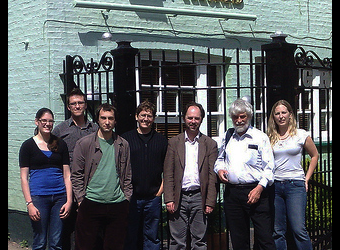The international Economics and the Commons Conference is off to a flying start. More than 200 commoners from 30 countries met in Berlin May 22-25 to discuss “new ideas, practices and alliances” for gradually installing the commons as the “core paradigm” for our economy, our society and our lives.
Silke Helfrich, co-founder of the Commons Strategy Group, opened the event with a round of rousing answers to the question: How do you get to the commons?
Based on discussions with fellow co-founders David Bollier (former On the Commons editor) and Michel Bauwens (founder of the P2P Foundation), Helfrich offered insights in understanding how the commons can be effectively applied to improve people’s day-to-day lives.
Here are a few of her observations and ideas that grabbed my attention.
“The commons is not a resource but a process. The commons is about how we manage shared resources.”
“We must base our definition of the commons” not on things, “but on the principles of commoning,” which means the social networks that allow us to use commons.
There’s good news for everyone in realizing that “market fundamentalism” is not a scientific fact or natural law. “It’s just an idea, a mindset.”
We can undermine this mindset that money is the measure of all that matters in two ways: 1. “Demarketizing our vocabulary” (thinking hard about familiar phrases like “brand”, “product” and “selling ourselves”; 2. Focusing on the “commonification of our minds.
“Every economy is commons-based: socialism, capitalism.” The commons was providing for humans’ needs before either of those economic theories ever appeared
“She/he who takes from the commons has to contribute to the commons.”
Knowledge is an essential commons that operates by entirely different principles than more easily-recognizable commons. “Water gets less when you share it. Knowledge gets more when you share it.”
Every commons needs protection.
The conference was a commons in itself, deliberately planned to include ample time for discussion and convivial spaces for attendees to get to know one another.
Rather than the usual Q-and-A at the close of a presentation, we were encouraged to share our own ideas with the audience. The first morning, for instance, began with fresh perspectives on caregiving, public infrastructure and the dual role of the commons as both a reform and revolutionary movement, followed by a spate of equally compelling observations.
Anne Snick, coordinator of the Brussels-based Flora Network of Expertise on Gender, Sustainability and Interconnected Economics, agreed that services like parenting and caring for sick and aged people must be recognized as at least as important as paid labor in the workforce. But she added that caring for the earth should be revered and rewarded too. It is just as time-consuming, unheralded and essential as other forms of caregiving.
Pat Conaty, a fellow of the New Economics Foundation who lives in Wales, reminded everyone that this movement is not starting from scratch— the commons is in sync with the missions of powerful institutions, which could become closer partners in creating a more sustainable, equitable, sharing world.
A number of us joined Conaty at for a lengthy conversation over lunch, where he outlined four already existing sectors that could potentially increase the capacity of commons initiatives.
1. Cooperatives With 1 billion members and 3 billion users around the globe, co-ops may be the world’s biggest engine for economic equity.
2. Municipalities This is “small ‘g’ government”, Conaty says, which is trusted by most people and able to work in a more collaborative way.
3. Trade Unions A still-powerful force in many parts of the world with the ability to challenge the power and policies of both corporations and the state (which today is all-too-frequently controlled by corporations).
4. Civil Society and Community Organizations A flourishing ecosystem of initiatives in many cases already sharr the commons perspective.
The Economics and Commons Conference—which follows up on the first international commons conference held in Berlin in 2010—was sponsored by the Commons Strategies Group, Remix the Commons.org, the Charles Leopold Mayer Foundation, and the “Heinrich Boll Foundation”:http://www.boell.org/










